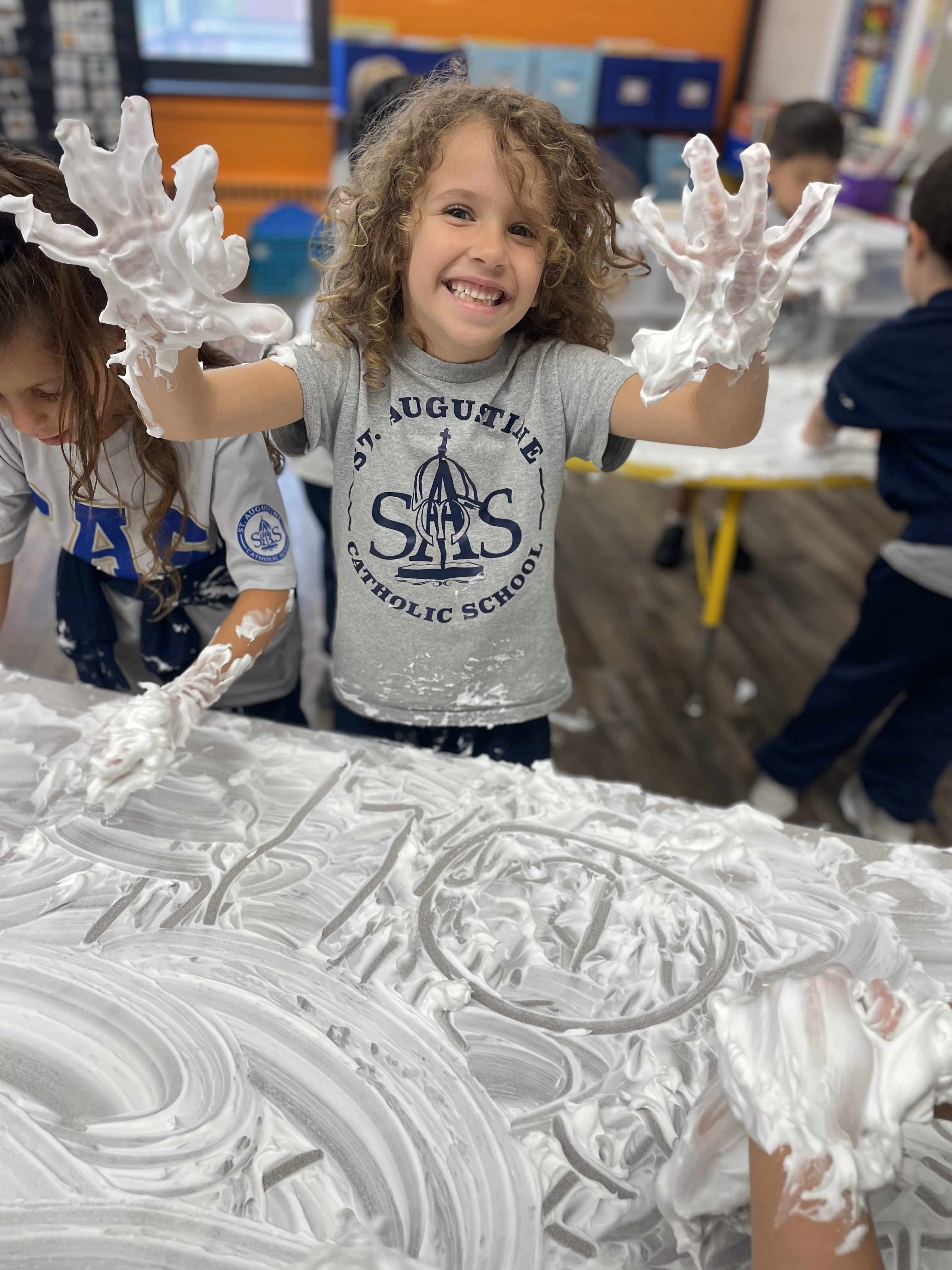Kindergarten
A variety of strategies and projects are used to teach the academic subjects. These include: analyzing, writing, memorizing, performing, summarizing, sequencing, interpreting, and critical thinking. Special activities include: creating stories, poems, book reports, essays, recitations, dramatizations, and dioramas.
Specialized instructors in art, music, library, technology, Spanish, and physical education supplement instruction by classroom teachers.
In language arts, students progress from basic writing skills to full expression, from the ability to read to a love of reading. They receive continuing instruction in grammar, spelling, capitalization and punctuation and are also exposed to increasingly challenging literature in a full range of writing styles, topics and cultures.
Instruction in math is aimed at enabling students to develop mathematical understanding and procedural skills that ensure readiness for math at the college and career level. Through carefully sequenced instruction students learn to reason abstractly and quantitatively. They are able to construct viable arguments and critique the reasoning of others. Manipulatives are used in mathematics to facilitate concept development and logical reasoning, and to apply mathematics to problem solving.
Skills developed in language arts and math are applied in social studies, religion and science.
Subject Areas at St. Augustine School
Religion
“Bringing Good News” is the Archdiocese of Baltimore Religion Curriculum for Elementary Schools. This standards-based curriculum serves as a guide, a road map for both teachers and students as they embark on a journey, which will provide them with the knowledge and understanding of the faith as witnessed in the teachings and the traditions of the Catholic Church. The curriculum is built on the Six Tasks of Catechesis: Promoting Knowledge of the Faith; Liturgical Education; Moral Formation; Teaching to Pray; Education for Community Life; and Missionary Initiation and is aligned with the Assessment of Catholic Religious Education (IFG:ACRE).
By the completion of kindergarten, students will master a variety of skills including:
- Communicate that God is Trinitarian by demonstrating the Sign of the Cross.
- State that God made us to know, love and serve Him and to be happy with Him always.
- Understand that God is always available to us in prayer even when we are afraid.
- Understand that God has entrusted to all human beings responsibility for the world and its creatures.
- Begin to memorize and pray those prayers from the Catholic tradition including the Our Father, Hail Mary, and Glory Be.
- Identify the church as a sacred place where the people of God gather to pray and to worship God.
- Understand that our actions and words in every life situation should reflect that we are followers of Jesus.
English Language Arts
The English Language Arts Curriculum for the Archdiocese of Baltimore is designed using the Catholic, College and Career Ready clusters as its foundation. Through literature, this course of study fosters students’ Catholic identity, shaping them to be models of Christian living for others. This curriculum is fully integrated with our Catholic faith. We provide students with a curriculum that is rigorous and rich in literature, oral and written language, grammar, writing, vocabulary, informational literature, and multimedia/technology.
By the completion of Kindergarten, students will master a variety of skills including:
- Making connections to the text.
- Greater emphasis on the writing process.
- Memorize and recite address, phone number, and birthday
- Fine motor control in order to draw, color, and print.
- Ability to hold pencil and crayon properly, control pencil and crayon and scissors, and color within boundaries.
- Ability to sit properly and hold the paper in the correct position for writing.
Mathematics
The curriculum for all elementary schools in the Archdiocese of Baltimore include the following units:
- Counting and Cardinality
- Operations and Algebraic Thinking
- Measurement and Data
- Numbers and Operations in Base Ten
- Geometry
- Numbers and Operations
Catholic educators never forget that our schools exist to bring our students to Christ. By continuing to implement new standards that are challenging, we work to fulfill the promise of quality Catholic education that educates the whole child, both mind and soul.
By the completion of Kindergarten, students will master a variety of skills including:
- Know number names and the count sequence.
- Understand addition as putting together and adding to, and understand subtraction as taking apart and taking from.
- Describe and compare measurable attributes.
- Classify objects and count the number of objects in each category.
- Analyze, compare, create, and compose shapes.
Additional Subject Areas
The following subject areas are currently under revision across the Archdiocese of Baltimore, and if you would like more information regarding these standards and essential skills please contact the school directly.
- Science
- Social Studies
- Visual and Performing Arts
- Physical Education/Health
- Instructional Technology
- Music
- Spanish
Explore St. Augustine School By Grade Level

Preschool

Kindergarten

Elementary School



